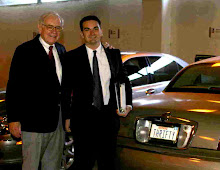Debt-financed Dividends Part I
I thought about this, questioning my own understanding of capital structure, but couldn’t convince myself that such an event actually benefited Ameritrade shareholders. Isn’t the company essentially forcing shareholders to take on a loan they never asked for and, at the same time, forcing an income tax payment that could otherwise be deferred (and at a long-term capital gains tax rate) to be made this year? About a year after that, Joe Moglia visited our college and I had the opportunity to speak with him one-on-one.
I can say unhesitatingly that Mr. Moglia is an outstanding and motivational leader. The story of his life is rather famous in business now, and I was not dissuaded of the characterization and reputation that follows him. He really seems like a great guy. Nonetheless I couldn’t get past the seemingly irrational dividend payment the company had made. And so I asked him, “What was the rationale behind borrowing to pay a dividend?” His response, peppered with reminders of how beneficial the merger would be, was that the special dividend was a reward to the Ameritrade shareholders that had stuck with the company throughout the difficult times following the tech bubble.
I was unconvinced. Naturally the stock price immediately dropped by $6 upon the dividend payment, and the balance sheet was left much more levered. So although the shareholders were “rewarded” with a check for $6, their stock was also worth just as much less. Not my kind of reward. Surely there is a reasonable explanation for this. When I pressed further, Mr. Moglia explained that the company had an excellent credit rating and sufficient cash flow to pay off all the debt within a few years.
Still, though, the plan had several blatant drawbacks. Through interest expense it reduces the company's future net income and the repayment of the principal will dramatically reduce future free cash flow. This limits the amount of capital available to be reinvested and used to expand the business. Where would such capital thus need to come from? Well either from borrowing more, resulting in mitigated net reduction of the debt, or from issuing more equity, which would dilute the current shareholders’ proportional ownership.
Dividends have become more popular and investor demand for them has increased over the past few years as the simple result of their new tax status. Long-term capital gains were once taxed at a rate of 20%, which was usually always less than the marginal tax rate investors would pay on their dividends. So there was a clear disadvantage to dividends.
With both long-term capital gains tax rates and dividend tax rates now both at 15%, there is more parity and the new relative attractiveness of dividends has made them more common. But that doesn’t excuse their overuse. Dividends still face the disadvantage of forcing a tax payment sooner rather than later.
Of course all this is old news now, but I have been thinking about the issue lately because there have been three similar special dividends announced that have caught my eye. As with the case of Ameritrade, the justification for them seems to me to be dubious. The announcements come from Health Management Associates (HMA), Scotts Miracle-Gro (SMG) and Dean Foods (DF). I will look at each of those in Parts II and III.
FD: I have no position in any company mentioned in this post.


3 Comments:
Andy,
Oftentimes you will see these kinds of dividend payments with stocks that have large insider ownership, such as AMTD. It's a good way for them to reap a cash payout without granting more options or boosting executive compensation to astronomical levels. The Rickets family owns a ton of stock, I believe, and he is chairman of the board at AMTD.
I don't follow the other companies you mentioned very closely, but if they have large insider ownership, it would not surprise me. If memory serves, Steve Wynn and Wynn Resorts paid out a nice special dividend last year, and he owns a ton of stock. It was just an easy way to cash in some chips, pardon the pun.
By Webmaster, at 23 March, 2007 10:25
Webmaster, at 23 March, 2007 10:25
You are beating me to the punch, Chad, but are absolutely right. The one common trait I observe is that there is huge insider ownership in all cases. This kind of thing allows the insiders to cash out without giving up their share of ownership as they would if they simply sold their shares. Nevertheless, the other shareholders suffer.
By Andy Kern, at 23 March, 2007 11:30
Andy Kern, at 23 March, 2007 11:30
If they really are underleveraged though, investors might not mind levering up the balance sheet. You would think they would prefer stock buybacks to special dividends in such a case, but I guess dividends win out with large insider ownership. Without that, buybacks would be a better use to boost EPS and help all shareholders proportionately.
By Webmaster, at 26 March, 2007 12:11
Webmaster, at 26 March, 2007 12:11
Post a Comment
<< Home